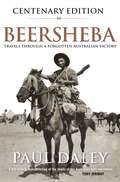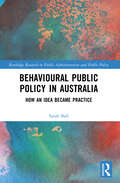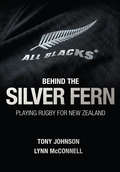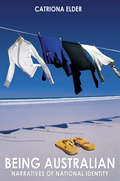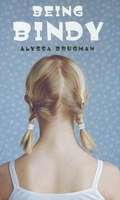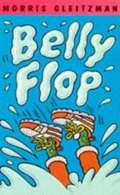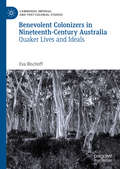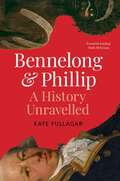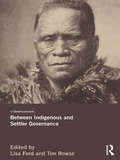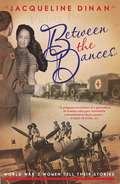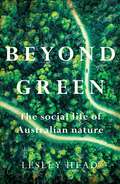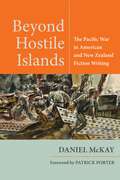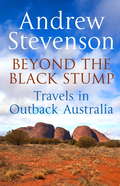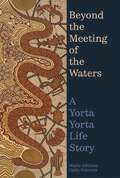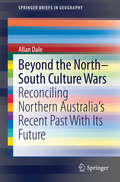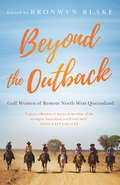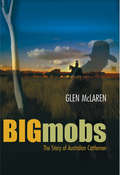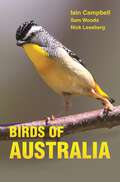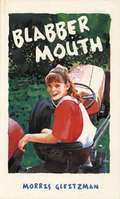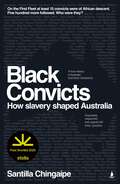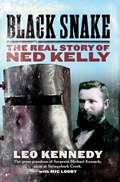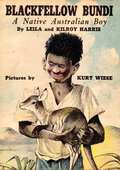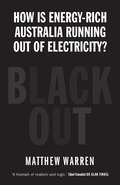- Table View
- List View
Beersheba Centenary Edition: Travels through a forgotten Australian victory
by Paul DaleyA hundred years ago in October 1917 members of the 4th Australian Light Horse Brigade participated in what is now regarded as the last great successful cavalry charge. Waving bayonets overhead in the dying light, they raced across six kilometres of exposed ground in Palestine, surprising the well-entrenched Turks. It was the decisive blow in the British capture of the strategic stronghold of Beersheba. The story of this remarkable military victory has largely slipped through the cracks of history, eclipsed in Australian sentiment by stories of dramatic defeat and loss at Gallipoli and on the Western Front. Paul Daley goes in search of the story of Beersheba. What he uncovers is a story of ordinary men capable of extraordinary acts, as he sheds new light on a dark episode starkly at odds with the Anzac mythology.
Behavioural Public Policy in Australia: How an Idea Became Practice (Public Administration and Public Policy)
by Sarah BallUsing rich ethnographic data and first-hand experience, Ball presents a detailed account of Australia’s attempts to incorporate behavioural insights into its public policy. Ball identifies three competing interpretations of behavioural public policy, and how these interpretations have influenced the use of this approach in practice. The first sees the process as an opportunity to introduce more rigorous evidence. The second interpretation focuses on increasing compliance, cost savings and cutting red tape. The last focuses on the opportunity to better involve citizens in policy design. These interpretations demonstrate different ‘solutions’ to a series of dilemmas that the Australian Public Service, and others, have confronted in the last 50 years, including growing politicisation, technocracy and a disconnect from the needs of citizens. Ball offers a detailed account of how these priorities have shaped how behavioural insights have been implemented in policy-making, as well as reflecting on the challenges facing policy work more broadly. An essential read for practitioners and scholars of policy-making, especially in Australia.
Behind the Silver Fern: Playing Rugby for New Zealand (Behind the Jersey Series)
by Tony Johnson Lynn McConnellA complete history of rugby&’s most famous yet enigmatic team, the New Zealand All Blacks, told by the men who have worn the iconic black jersey. Go behind the scenes with the world&’s most successful sports team. From the legendary 1905 &“Originals&” all the way through to Richie McCaw&’s record-breaking back-to-back World Cup champions of 2015, this is a history of the All Blacks like you have never experienced it before. Thanks to exhaustive archival research and exclusive new material garnered from a vast array of interviews with players and coaches from across the decades, Behind the Silver Fern unveils the compelling truth of what it means to play for the team that has dominated Test match rugby for over a century—all the trials and tribulations behind the scenes, the glory, the drama and the honor on the field, and the passionate friendships and bonds of a brotherhood off it. Absorbing and illuminating, this is the ultimate history of New Zealand rugby—told, definitively, by the men who have been there and done it.&“A treat for anybody who enjoys a little inside track into the great and controversial moments. There is little as revealing in sport as thoughts delivered straight from the horse&’s mouth.&” —The Rugby Paper
Being Australian: Narratives of national identity
by Catriona ElderAfter a century of speculation by writers, filmmakers, travelers and scholars, being Australian' has become a recognisable shorthand for a group of national characteristics. Now, in an era of international terrorism, being seen as un-Australian' has become a potent rhetorical weapon for some, and a badge of honour for others.Catriona Elder explores the origins, meaning and effects of the many stories we tell about ourselves, and how they have changed over time. She outlines some of the traditional stories and their role in Australian nationalism, and she shows how concepts of egalitarianism, peaceful settlement and sporting prowess have been used to create a national identity. Elder also investigates the cultural and social perspectives that have been used to critique dominant accounts of Australian identity, including ideas of class, gender, sexuality, ethnicity and race. She shows how these critiques have been, in turn, queried in recent years. Being Australian is an ideal introduction to studying Australia for anyone interested in understanding Australian society, culture and history. A clever work: incisive and original. At a time when Australian identities have never been more debated, Elder finds an open way through the closed doors which often restrict cultural representations of Australian-ness.'Professor Adam Shoemaker, Dean of Arts, ANU This is a timely and significant new analysis essential reading on issues of identity and our own anxieties about national belonging and what it means to be Australian' in a globalising world.'Kate Darian-Smith, Professor of Australian Studies and History, University of Melbourne
Being Bindy
by Alyssa BrugmanEighth grade is torture-at least it is for Bindy! (1) Her best friend since kindergarten becomes her worst enemy. (2) She's stuck taking yoga in sports ed, where she unleashes the Very Bad Thing that gets the whole school talking. (3) She suffers total humiliation when certain unmentionables are tossed around at assembly. What's more, Bindy's divorced parents are behaving badly. (1) Her laid-back father looks like he's falling for-could it be?- none other than her ex-best friend's mother. Which means that . . . (2) . . . Bindy's worst enemy might just end up as her sister! (3) Her domineering mom always wants Bindy to do things her way. Enough is enough! To survive the drama in her life, Bindy must make some tough decisions in this funny, searching novel about being true to yourself.
Belly Flop
by Morris GleitzmanMitch Weber believes there's only one way to stop everyone in town hating him. Become a champion diver. It's a risky plan, but Mitch also believes in a guardian angel called Doug. He hopes Doug is listening...
Benevolent Colonizers in Nineteenth-Century Australia: Quaker Lives and Ideals (Cambridge Imperial and Post-Colonial Studies Series)
by Eva BischoffThis book reconstructs the history of a group of British Quaker families and their involvement in the process of settler colonialism in early nineteenth-century Australia. Their everyday actions contributed to the multiplicity of practices that displaced and annihilated Aboriginal communities. Simultaneously, early nineteenth-century Friends were members of a translocal, transatlantic community characterized by pacifism and an involvement in transnational humanitarian efforts, such as the abolitionist and the prison reform movements as well as the Aborigines Protection Society. Considering these ideals, how did Quakers negotiate the violence of the frontier? To answer this question, the book looks at Tasmanian and South Australian Quakers’ lives and experiences, their journeys and their writings. Building on recent scholarship on the entanglement between the local and the global, each chapter adopts a different historical perspective in terms of breadth and focused time period. The study combines these different takes to capture the complexities of this topic and era.
Bennelong and Phillip: A History Unravelled
by Kate FullagarThe first joint biography of Bennelong and Governor Arthur Phillip, two pivotal figures in Australian history – the colonised and coloniser – and a bold and innovative new portrait of both.Australian Book Review Books of the Year 2023Sydney Morning Herald Best Reads of the Year for 2023 Bennelong and Phillip were leaders of their two sides in the first encounters between Britain and Indigenous Australians, Phillip the colony&’s first governor, and Bennelong the Yiyura leader. The pair have come to represent the conflict that flared and has never settled. Fullagar&’s account is also the first full biography of Bennelong of any kind and it challenges many misconceptions, among them that he became alienated from his people and that Phillip was a paragon of Enlightenment benevolence. It tells the story of the men&’s marriages, including Bennelong&’s best-known wife, Barangaroo, and Phillip&’s unusual domestic arrangements, and places the period in the context of the Aboriginal world and the demands of empire. To present this history afresh, Bennelong & Phillip relates events in reverse, moving beyond the limitations of typical Western ways of writing about the past, which have long privileged the coloniser over the colonised. Bennelong&’s world was hardly linear at all, and in Fullagar&’s approach his and Phillip&’s histories now share an equally unfamiliar framing.
Between Indigenous and Settler Governance
by Lisa Ford Tim RowseBetween Indigenous and Settler Governance addresses the history, current development and future of Indigenous self-governance in four settler-colonial nations: Australia, Canada, New Zealand and the United States. Bringing together emerging scholars and leaders in the field of indigenous law and legal history, this collection offers a long-term view of the legal, political and administrative relationships between Indigenous collectivities and nation-states. Placing historical contingency and complexity at the center of analysis, the papers collected here examine in detail the process by which settler states both dissolved indigenous jurisdictions and left spaces – often unwittingly – for indigenous survival and corporate recovery. They emphasise the promise and the limits of modern opportunities for indigenous self-governance; whilst showing how all the players in modern settler colonialism build on a shared and multifaceted past. Indigenous tradition is not the only source of the principles and practices of indigenous self-determination; the essays in this book explore some ways that the legal, philosophical and economic structures of settler colonial liberalism have shaped opportunities for indigenous autonomy. Between Indigenous and Settler Governance will interest all those concerned with Indigenous peoples in settler-colonial nations.
Between the Dances
by Jacqueline DinanThe start of World War 2 changed women's lives and their place in Australian society forever. Thousands of women ventured where few had gone before - into the services and workplaces previously considered the sole preserve of men. In preparation for her book Between the Dances, Jacqueline Dinan, interviewed over three hundred women around Australia to collect the last first hand stories from World War 2. Revealing poignant and personal conversations, photographs and letters, Between the Dances is a testament to real life during World War 2. From Malta to Australia, New Zealand to the UK, the challenges and adventures faced by these women were unprecedented. Their passion, courage, resilience and commitment during wartime were all a precursor to the astonishing changes brought about by this incredible generation. For the first time, women were doing their bit as nurses in war zones, members of the services, farmhands, factory workers or volunteers in community service. The last tradition left was the weekly dance, which ceremoniously brought these courageous women and men together for a quickstep, fox trot and brief respite from the rigours of wartime. The accounts are enhanced by poignant, amusing and insightful anecdotes along with scores of previously unpublished and unique photographs from personal albums. Jacqueline's former experience was in corporate and art communications and events, before she embarked on her own public relations and events business. Now a regular speaker with the Country Women's Association, Australian Rotary Clubs, Legacy, Red Cross and Memorial groups, Jacqueline has become a well-known figure amongst The Returned & Services League of Australia.
Beyond Green: The Social Life of Australian Nature
by Lesley HeadHow are we to think about nature and the environment? The idea of nature as it relates to culture, society and humans has always been in constant flux and highly contested. Lesley Head interrogates the ways the cultures of nature have operated in Australia across time, and how these ways of thinking and being limit our capacity to deal with the challenges of the climate change and biodiversity crises. Drawing on her life&’s work and lessons she has picked up along the way, Head suggests that it is up to us to attentively listen, the better to destabilise and subvert dominant narratives, and to imagine new possibilities. She believes we have the nous, resources and lessons from Indigenous, settler-descendant and immigrant cultures to reduce risk in the face of the unexpected and the unimaginable. In Beyond Green, the story of nature and people weaves research and personal experience through many different times and spaces, offering new ways of understanding. It is a richly creative engagement with the abundant possibilities and pleasure of nature as a place of regeneration that is as warned by the rawk of the crow as it is accompanied by the carolling of magpies.
Beyond Hostile Islands: The Pacific War in American and New Zealand Fiction Writing (World War II: The Global, Human, and Ethical Dimension)
by Daniel McKayWINNER, JAVIER COY BIENNIAL RESEARCH AWARD, BEST MONOGRAPHOffers a fascinating window into how the fraught politics of apology in the East Asian region have been figured in anglophone literary fiction.The Pacific War, 1941-1945, was fought across the world’s largest ocean and left a lasting imprint on anglophone literary history. However, studies of that imprint or of individual authors have focused on American literature without drawing connections to parallel traditions elsewhere. Beyond Hostile Islands contributes to ongoing efforts by Australasian scholars to place their national cultures in conversation with those of the United States, particularly regarding studies of the ideologies that legitimize warfare. Consecutively, the book examines five of the most significant historical and thematic areas associated with the war: island combat, economic competition, internment, imprisonment, and the atomic bombing of Hiroshima and Nagasaki.Throughout, the central issue pivots around the question of how or whether at all New Zealand fiction writing differs from that of the United States. Can a sense of islandness, the ‘tyranny of distance,’ Māori cultural heritage, or the political legacies of the nuclear-free movement provide grounds for distinctive authorial insights? As an opening gambit, Beyond Hostile Islands puts forward the term ‘ideological coproduction’ to describe how a territorially and demographically more minor national culture may accede to the essentials of a given ideology while differing in aspects that reflect historical and provincial dimensions that are important to it. Appropriately, the literary texts under examination are set in various locales, including Japan, the Solomon Islands, New Zealand, New Mexico, Ontario, and the Marshall Islands. The book concludes in a deliberately open-ended pose, with the full expectation that literary writing on the Pacific War will grow in range and richness, aided by the growth of Pacific Studies as a research area.
Beyond the Black Stump: Travels around Australia
by Andrew StevensonA seasoned traveller, travel writer Andrew Stevenson is unafraid of the unconventional. Whilst most people visiting Australia tread the well worn path from the Sydney Opera House to Cairns up the East Coast, Andrew disappeared into the Australian outback in search of the original Australians - the Aboriginal People. "If you want to meet them nowadays, you've got to go beyond the black stump!" He was told. Going where few have gone before, Andrew delves into the Outback without fear. Drinking in bars with people even the locals avoid, asking questions that we all want to hear the answers to. Written with humour and compassion his powers of observation and enquiring mind draw out a frankness that is sometimes shocking but something from which we can all learn. Beyond the Black Stump: Travels around Australia is no ordinary tale of an intrepid traveller, it is an extraordinary account of an Australia that we have not seen before.
Beyond the Black Stump: Travels around Australia
by Andrew StevensonA seasoned traveller, travel writer Andrew Stevenson is unafraid of the unconventional. Whilst most people visiting Australia tread the well worn path from the Sydney Opera House to Cairns up the East Coast, Andrew disappeared into the Australian outback in search of the original Australians - the Aboriginal People."If you want to meet them nowadays, you've got to go beyond the black stump!" He was told. Going where few have gone before, Andrew delves into the Outback without fear. Drinking in bars with people even the locals avoid, asking questions that we all want to hear the answers to.Written with humour and compassion his powers of observation and enquiring mind draw out a frankness that is sometimes shocking but something from which we can all learn. Beyond the Black Stump: Travels around Australia is no ordinary tale of an intrepid traveller, it is an extraordinary account of an Australia that we have not seen before.
Beyond the Meeting of the Waters: A Yorta Yorta Life Story
by Wayne Atkinson Catherine Guinness&‘Storyline&’ is the word used to describe the way the Indigenous stories relate with each other like veins running across the land. They are passed on by word of mouth and are communicated through other mediums: art, language, music and ceremony.Yorta Yorta Elder Wayne Atkinson&’s storyline begins, like thousands of generations before him, on the banks of a river, but it would take him to the halls of higher learning and a lifetime of activism to further the empowerment of his people. For Atkinson, education is a life-giving river that can be traced back to the teachings of his great grandfather and his Elders. This eventually led him to a university education and he became a much-loved teacher of Indigenous Studies at the University of Melbourne, where he pioneered the concept of Oncountry Learning. An essential voice of his generation, Atkinson has been at the forefront of Aboriginal cultural renaissance in Victoria since the 1980s, when Kooris asserted their rights to self-determination. His advocacy for human rights has contributed to widespread reform. He also played a pivotal role in the Yorta Yorta Native Title land claim and was a commissioner with the Yoorrook Justice Commission.Beyond the Meeting of the Waters is a penetrating and deeply humane insight into the power of the voice, the spear of the pen and the potential of collective organisation.
Beyond the North-South Culture Wars: Reconciling Northern Australia's Recent Past With Its Future (SpringerBriefs in Geography)
by Allan DaleIncreasingly, Australia's agriculturalists are looking to the nation's north to escape the decline in southern Australia's water and soil resources. Booming mineral and gas development is also helping to drive the nation's economic success. At the same time, the south's conservation sector would like to see much of the north preserved as iconic wilderness. Both conservation and resource development interests alike are often at odds with the interests of the north's traditional owners, many of whom remain trapped in welfare dependency and poverty. Indeed, to the ire of north Australians, the past five decades of north Australian history have indeed been characterized by these national-scale conflicts being played out in regional and local communities. This book explores these conflicts as well as the many emerging opportunities facing the development of the north, suggesting that a strong cultural divide between northern and southern Australia exists; one that needs to be reconciled if the nation as a whole is to benefit from northern development. The author first explores where these historical conflicts could take us without a clear forward agenda. A story-based personal narrative from his long and diverse experience in the north gives life to these themes. Finally, the book then draws on these stories to help shape a cohesive agenda for the north's future.
Beyond the Outback: Gulf Women of Remote North West Queensland
by Bronwyn BlakeTwenty women share their incredible stories of surviving and thriving in the remote Australian 'Gulf Country', near the Gulf of Carpentaria.Gulf women are self-sufficient, generous, and can cope with almost anything that life and the environment throws at them: floods, drought, sickness, emergencies. Whether they are graziers, fisherwomen, ringers, women in tourism, aviation and education, Indigenous women or descendants from early women settlers, this powerful book gives these women a voice to tell their own stories.There are stories of new mothers on properties isolated and inaccessible for months in the wet season; women giving birth at home with only neighbours to assist; reminiscences from last century and World War II, and accounts of fishing in the Gulf in sometimes unimaginable conditions.From the kids wanting a baby croc for a pet to the terror of a snake bite with a flooded airstrip and impassable roads, these women treat the extraordinary events in their lives as just part of their remote way of life.Set in a world of vast landscapes, distance and merciless climate, Beyond the Outback contains riveting tales of the lives of the women who live, work and raise families in one of Australia's most isolated regions. It will be loved by readers of Sara Henderson, Toni Tapp Coutts and Terry Underwood.
Big Mobs: The Story of Australian Cattlemen
by Glen MclarenPreviously overshadowed in the public imagination by notions of American cowboys and the wild west, Australian stockmen are given the place they so richly deserve in pastoral and Australian history in this insightful study. From the lonely months on a long cattle drive to the boots they wore and the places they lived in, the stockmen and their unique way of life is intelligently explored in this comprehensive work.
Birds of Australia: A Photographic Guide
by Iain Campbell Sam Woods Nick LesebergThe best photographic field guide to Australia's birdsAustralia is home to a spectacular diversity of birdlife, from parrots and penguins to emus and vibrant passerines. Birds of Australia covers all 714 species of resident birds and regularly occurring migrants and features more than 1,100 stunning color photographs, including many photos of subspecies and plumage variations never before seen in a field guide. Detailed facing-page species accounts describe key identification features such as size, plumage, distribution, behavior, and voice. This one-of-a-kind guide also provides extensive habitat descriptions with a large number of accompanying photos. The text relies on the very latest IOC taxonomy and the distribution maps incorporate the most current mapping data, making this the most up-to-date guide to Australian birds.Covers all 714 species of resident birds and regularly occurring migrantsFeatures more than 1,100 stunning color photosIncludes facing-page species accounts, habitat descriptions, and distribution mapsThe ideal photographic guide for beginners and seasoned birders alike
Blabber Mouth
by Morris GleitzmanSet in Australia, this humorous and touching story of the misadventures of a clever girl who cannot speak and her social misfit of a father will delight readers.
Black Convicts: How slavery shaped Australia
by Santilla ChingaipeThe story of Australia&’s Black convicts has been all but erased from our history. In recovering their lives, Santilla Chingaipe offers a fresh understanding of this fatal shore, showing how empire, slavery, race and memory have shaped our nation. On the First Fleet of 1788, at least 15 convicts were of African descent. By 1840 the number had risen to almost 500. Among them were David Stuurman, a revered South African chief transported for anti-colonial insurrection; John Caesar, who became Australia&’s first bushranger; Billy Blue, the stylishly dressed ferryman who gave his name to Sydney&’s Blues Point; and William Cuffay, a prominent London Chartist who led the development of Australia&’s labour movement. Two of the youngest were cousins from Mauritius—girls aged just 9 and 12—sentenced over a failed attempt to poison their mistress. But although some of these lives were documented and their likenesses hang in places like the National Portrait Gallery, even their descendants are often unaware of their existence. By uncovering lives whitewashed out of our history, in stories spanning Africa, the Americas and Europe, Black Convicts also traces Australia&’s hidden links to slavery, which both powered the British Empire and inspired the convict system itself. Situating European settlement in its global context, Chingaipe shows that the injustice of dispossession was driven by the engine of labour exploitation. Black Convicts will change the way we think about who we are.
Black Snake
by Leo Kennedy Mic LoobyAuthor Leo Kennedy is the great-grandson of Sergeant Michael Kennedy. Raised in the shadow of his great-grandfather?s murder, Leo witnessed the deep psychological wounds inflicted on successive generations of his family ? and the families of other victims ? as the Ned Kelly myth grew around them and the sacrifice of their loved ones was forgotten. Leo himself was nicknamed `Red Ned? at school and taunted for being on the wrong side of Australian history. Now, for the first time, and in brilliant prose that brings these historical episodes to life, Black Snake challenges the legend of Ned Kelly. Instead of celebrating an heroic man of the people, it gives voice to the victims of a merciless gang of outlaws. This is a captivating true story, gleaned from meticulous research and family history, of two men from similar backgrounds whose legacies were distorted by history.
Blackfellow Bundi: A Native Australian Boy
by Leila Gott Harris Kilroy HarrisLeila Gott Harris’s Blackfellow Bundi: A Native Australian Boy offers a tender and insightful portrayal of the life and experiences of Bundi, a young Aboriginal boy navigating the challenges and joys of his cultural heritage in the Australian bush. Written with empathy and vivid detail, the book brings to life the traditions, struggles, and resilience of Indigenous Australians in a rapidly changing world.Through Bundi’s eyes, readers are introduced to the beauty of the land, the deep connection of his people to their environment, and the wisdom passed down through generations. Harris explores themes of identity, community, and belonging, as Bundi learns about his culture and navigates the complexities of interactions with settlers and the encroaching modern world.Rich with evocative descriptions and heartfelt moments, Blackfellow Bundi captures the spirit of a boy growing up in a time of cultural collision, where the preservation of heritage stands alongside the pressures of change. Harris weaves a narrative that is both educational and moving, offering readers a glimpse into the unique perspectives and challenges faced by Aboriginal communities.This book is not only a coming-of-age story but also a celebration of Indigenous traditions, highlighting the importance of understanding and respecting diverse cultures. Perfect for readers of all ages, Blackfellow Bundi invites reflection on the shared humanity that transcends cultural divides while honoring the richness of Australia’s First Peoples.
Blackout
by Matthew WarrenFor 20 years Australia has been in political denial about the seismic changes occurring in the way we power our country. Successive governments continue to tell people that power prices will fall while the lights stay on. Debate is reduced to two equally preposterous narratives: coal-fired, climate change indifference versus an impossibly utopian renewable energy future. This nonsense swirls around an incredulous public while power prices rise, the grid is stretched, energy becomes political poison and the earth warms. How did it come to this and how can we find our way out of this mess? Matthew Warren has worked for all sides of the energy industry, is regularly attacked for being too pro-coal and too pro-renewables, and writes without fear or favour. He has been lobbying for a national climate and electricity policy for over a decade. With an entertaining and fascinating narrative, Blackout cuts through the waffle to chart the disintegration of Australia?s energy security, call out what is holding us back, and plot the way for a brighter future.
Blackout
by Matthew WarrenFor 20 years Australia has been in political denial about the seismic changes occurring in the way we power our country. Successive governments continue to tell people that power prices will fall while the lights stay on. Debate is reduced to two equally preposterous narratives: coal-fired, climate change indifference versus an impossibly utopian renewable energy future. This nonsense swirls around an incredulous public while power prices rise, the grid is stretched, energy becomes political poison and the earth warms. How did it come to this and how can we find our way out of this mess?Matthew Warren has worked for all sides of the energy industry, is regularly attacked for being too pro-coal and too pro-renewables, and writes without fear or favour. He has been lobbying for a national climate and electricity policy for over a decade. With an entertaining and fascinating narrative, Blackout cuts through the waffle to chart the disintegration of Australia&’s energy security, call out what is holding us back, and plot the way for a brighter future.
